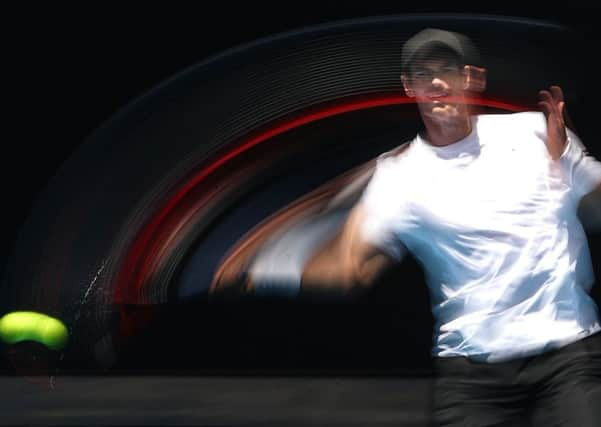Aidan Smith: Andy Murray meant we no longer had to accept plucky loserdom


You didn’t know he held that title, too? Of course he does. A Scot winning Wimbledon was the movie idea Hollywood rejected for being too bonkers so they went with kitsch kilted klaptrap instead. A Scot winning Wimbledon actually happened, not once but twice, and if you’re still getting your heads round that then maybe you will be quicker to acknowledge the dawn of a new era, one with the dread initials of “PM” – Post-Murray. These signify we’ve had our tea, we’ve had our LSD, we’ve had our wild and crazy fun, and we won’t be flirting with such daft notions again for a long, long time. The rest of us, though, are going to find it bloody hard to cope.
We had grown accustomed to the exalted state and the rarefied air where we can not only hold our own in conversations about tennis – tennis! – but speculate in a vaguely authoritative way about when our man might next win another major. What kind of presumptuousness was this? What kind of madness?
Advertisement
Hide AdAdvertisement
Hide AdAnother major. Just typing these words feels decadent and delicious. We almost got blase and greedy. We very nearly asked for grapes to be peeled for us while we pondered his prospects in Melbourne, New York and Paris. But we didn’t. We gave grateful thanks that we were alive and in vague possession of our faculties during the glorious pomp of Andrew Barron Murray. We didn’t want to wake up from this bliss and now we don’t want to have to go to sleep.
It seems 100 years ago that I would try to persuade some English expats in the south-west of France of his genius. Actually, I was trying to persuade them of his right to compete at Wimbledon, outer courts, well away from the debenture-holders. Before his first major that was Murray’s (non)-status in Home Counties consciousness, and maybe especially the consciousness of those who’d left these shores and therefore retained a more idealised and romanticised view of what a tennis player should be.
Every summer when my wife and I visited her parents I sat on the verandah at boozy lunches and listened to the in-laws’ friends moan about Murray’s scowl, burst-sofa curls, bumfluff, surliness, shoutiness, slouchiness and all the other things which put the distance achieved by a serving cannon gone haywire between the young contender from Dunblane and that awfully nice Tim Henman.
I loved those arguments almost as much as I loved watching Murray strive, fail, cry, strive some more. Tennis wasn’t judged on etiquette or politesse and it wasn’t dressage for humans, I’d say. Nor was it a contest to find the best-mannered chap with the sharpest creases and most obedient parting in his hair that you’d like your daughters to marry.
It wasn’t as if Murray had piddled in the strawberries and cream; merely that he got grumpy with himself when a carefully-strategised crosscourt backhand return was swallowed up by the net. And what the hell did any of that matter – by then the wine had emboldened me sufficiently – if one fine day he could actually turn up and win?
It used to be said of tennis in Britain that it was a sport for people who didn’t actually like sport. Murray changed that attitude. No more did we have to accept and almost celebrate plucky loserdom in the same way we did the wrong kind of leaves on the train line. Glued to the TV at gone 3am for Flushing Meadows, the first Wimbledon cheered from France, the second witnessed from the press benches on Centre Court, every single shot of a serene victory. (Sack me now, boss, I don’t care). These are my memories to time-capsule in a ball tube and they cannot be topped.
Scotland may produce other champions but surely there won’t be another who has to bash down the door of a megastars-only, maximum-of-three private members’ club such as the one occupied by Rafa, Rog and Djoko. He won’t be able to stress – so avidly, trailblazingly and relentlessly – that the champion may not be a “he” but in fact a “she” because from now on any male sports star who declares himself a feminist will be summed up thus: “Oh, he’s just like Andy Murray.” And could our next illustrious sportsman possibly make Scots celebrate dourness and thrawnness like we were world champs at that as well while at the same time being hilarious only some poor fools didn’t get this? Probably unlikely.
If Murray, having achieved the seemingly impossible, especially for a Scot, and won Wimbledon only to reveal himself to be a dull automaton right afterwards and in all his subsequent utterings and deeds, then many would still have been grateful. But he wasn’t. He was Andy Murray. Just typing his name makes me happy but, also now, sad.
Advertisement
Hide AdAdvertisement
Hide AdA Scot with a racket in his hand shoots to No.1 in the world? Yes, that did just happen. And perhaps it wasn’t so fantastically improbable after all. The sport can be so tense if not downright tortuous to watch that you feel like you’re punishing yourself or indulging in devoutly-observed self-flagellation. All of us in the small, damp, cratered land can relate to that, I reckon, and maybe “PM” is not the end but the beginning. Maybe another Andy will rise up. Goodness me, Murray should be inspiration enough.
Potential title for a Murray biopic? Cooler Running. Back when they were making Brigadoon the producer arrived here to scout for good locations only to admit on his return to Hollywood: “I went to Scotland and found nothing there that looks like Scotland.” Imagine courts packed with mini-Murrays prompting similar bamboozlement. What a legacy that would be.